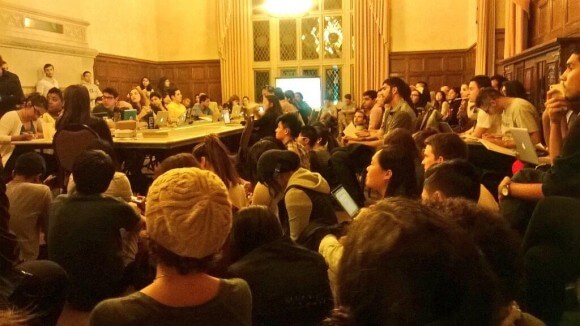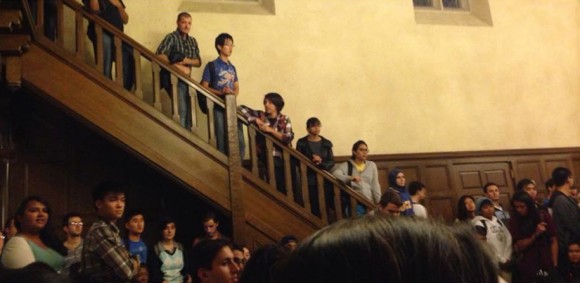
Students for Justice in Palestine (SJP) have chalked up another significant win–this time at UCLA (University of California, Los Angeles). SJP members spoke out against an anti-divestment resolution earlier this week and convinced student government legislators to vote down the bill by a margin of 7-5. The victory came just days before the national SJP conference at Stanford University.
On October 22nd, the UCLA Undergraduate Students Association Council voted to defeat “A Resolution In Support of Positive Steps Towards an Israeli-Palestinian Peace,” a bill that threatened to thwart the possibility of a divestment resolution before one even came up for a vote. While many UC student governments have voted in favor of divesting from companies, UCLA has yet to vote on one. In April 2013, the UCLA student government tabled a resolution that called on the UC system to align its investments with human rights standards, which included divestment from Israeli occupation profiteers.
The October 22 resolution also called for “positive investment” in Israel/Palestine while claiming that divestment was a source of “tension on campus.”
“Divestment resolutions at other UC campuses have had negative effects on campus climate,” the bill read. “Investment has the potential to foster positive discussion and promote cross-community collaboration.”
The student bill represented a new tactic in battle over BDS on campus that sought to use “positive investment” in companies involved in Israel/Palestine as a way to deflect from divestment efforts. But SJP members blasted “positive investment” and said that it ignored the voices of Palestinians like West Bank and Gaza Coca Cola CEO Zahi Khouri.
The hearing, which extended until 3 am, had some riveting moments, according to participants. The meeting opened up with an impassioned discussion that shined a glaring light on how student legislators go on politically oriented trips to Israel for free on the dime of the Anti Defamation League.
“Someone in the public comment mentioned the conflict of interest, the benefit of a free trip taken by a member of the council who sponsored resolution. And once public comment was over, the council started its own deliberations over this question before even talking about the resolution,” said SJP member Rahim Kurwa in our phone interview.
“It was a very captivating moment, the entire focus of the room was on this issue. The fact that the ADL, sponsors of these trips, has engaged in Islamophobic and anti-Palestinian campaigns was openly discussed in the room and at the council table,” said Kurwa. “The ADL’s free politically oriented trips for student leaders were now being discussed out in the open. Once it becomes a liability to take trips from pro-Israel groups with an agenda, once it becomes widely understood — and you can’t do it in the dark– the effectiveness disappears.”
One of the recent beneficiaries of these free Israel trips, Sunny Singh, was one of the two sponsors of the resolution. Singh wrote an op ed in the Daily Bruin, UCLA’s student newspaper, on the morning of the hearing. But his op-ed came back to bite him that very evening, sparking criticism of student affiliation with the ADL’s agenda-driven trips to Israel.
Another council member voting on the bill also took the ADL trip, and a third was a member of Bruins for Israel who attended an AIPAC conference as a delegate.
Students from a wide variety of campus organizations spoke against the bill, and Senators were particularly critical of the bill because it was done with no consultation with Palestinian students.
Witnessing council members deliberating the resolution after the two-and-a-half hour long public forum, Kurwa concluded that “some of the independent senators were the most critical of the bill, more than we were hoping. They seemed very moved by the public comment.” He added that “the critical thing is once senators realized the bill’s claim to support engagement was not matched by the author’s behavior, and once they realized that ‘positive investments’ was not what Palestinians actually wanted, then all that was left was the anti-divestment part of the bill. At that point the intentions were in question, and there was no longer a compelling reason to pass the bill.”
UCLA’s Muslim student newspaper Al-Talib reported:
External Vice President Maryssa Hall fought against passing this resolution due to the lack of student involvement and claimed that if a new resolution was brought to the table after real talks were made amongst the students, then it could be considered. To propose a bill that had no input from the student body, especially with such a controversial issue, has no substance.
The debate over the resolution came in the wake of various efforts by California state legislators to criticized the boycott, divestment and sanctions (BDS) movement and label it as “anti-Semitic.” But despite those efforts, SJP chapters have vowed to continue to push for divestment resolutions on campus.
“As a queer, immigrant Chicana I am often asked why I work with Students for Justice in Palestine,” Angelica Becerra, an SJP member at UCLA, wrote in an e-mail. “After seeing the solidarity from the rest of the communities with which I identify with come out to the council meeting, and voice their opposition to this resolution, the answer is simple. Everyone, regardless of their multiple intersecting identities should support Palestinian society’s self-determination. I will support the Palestinian cause until my last breath.”



This is a giant leap forward in so many ways.
Congratulations and thank you to SJP!
“Everyone, regardless of their multiple intersecting identities should support Palestinian society’s self-determination. I will support the Palestinian cause until my last breath.””
I totally agree with Angelica.
SJP rocks. Don’t let the Zionist community intimidate you EVER. Stand by your principles and beliefs and speak truth to those liars.
What amazes me is that if the political & MSM drumbeat was on the side of justice for Palestinians, it wouldn’t seem like propaganda (Like Israeli hasbara), but rather just a powerfully compelling argument for doing the right thing.
This is a reminder that anyone discouraging the discussion of what Israel is doing to the Palestinians has an agenda. CNN, the NY Times, NPR, etc., have an agenda.
RE: “The student bill represented a new tactic in battle over BDS on campus that sought to use ‘positive investment’ in companies involved in Israel/Palestine as a way to deflect from divestment efforts.” ~ Annie Robbins and Alex Kane
MY COMMENT: This idea of “positive investment” is essentially the old “constructive engagement” policy in a snazzy new suit! It will just give the Israeli’s more carrots to use in making more “carrot stew” to eat.*
● MAGGIE THATCHER’S OPPOSITION TO USING SANCTIONS AGAINST APARTHEID-ERA SOUTH AFRICA :
SOURCE – https://mondoweiss.mystagingwebsite.com/2013/04/supposed-democracy-dictator.html
● FROM WIKIPEDIA [Constructive engagement]:
SOURCE – http://en.wikipedia.org/wiki/Constructive_engagement
* ● FROM foreignaffairs.com: “South Africa: Why Constructive Engagement Failed”, By Sanford J. Ungar and Peter Vale, Winter 1985/86
SOURCE – http://www.foreignaffairs.com/articles/40525/sanford-j-ungar-and-peter-vale/south-africa-why-constructive-engagement-failed